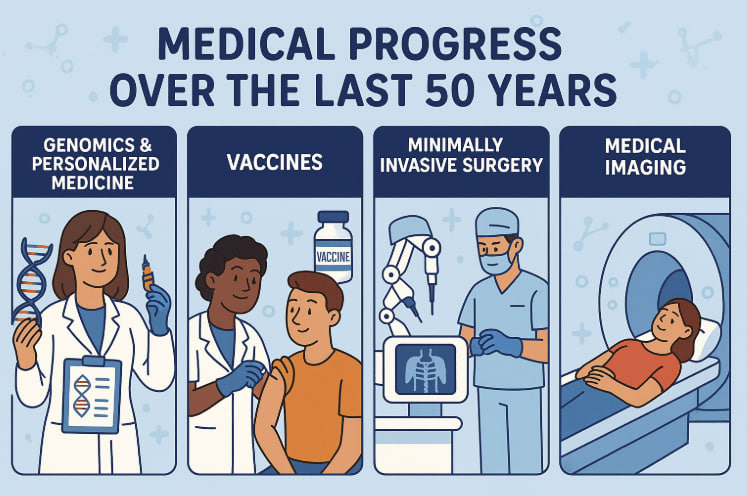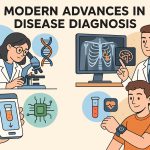In just half a century, medicine has undergone a revolution. From eradicating deadly diseases to unlocking the secrets of our DNA, the past 50 years have brought remarkable advances that have increased life expectancy, improved quality of life, and redefined patient care. This period marks one of the most dynamic eras in the history of healthcare.
1. Genomics and Personalized Medicine
One of the most groundbreaking shifts in medicine came with the decoding of the human genome in 2003. This achievement launched a new era of personalized medicine, where treatments are tailored to a person’s genetic makeup.
- Doctors can now identify genetic risk factors for conditions like cancer, Alzheimer’s, and heart disease.
- Treatments for rare diseases, including gene therapies, have emerged.
- Pharmacogenomics helps predict which drugs will be most effective or safe for each patient.
This has turned medicine from reactive to proactive and preventative.
2. Vaccines and Infectious Disease Control
Vaccination programs over the past 50 years have dramatically reduced global suffering:
- Eradication of smallpox in 1980 was a landmark achievement.
- HPV, hepatitis B, and meningitis vaccines have prevented millions of deaths.
- COVID-19 vaccines, based on mRNA technology, were developed and deployed in record time.
New methods, like needle-free and RNA-based vaccines, promise even broader protection in the future.
3. Minimally Invasive and Robotic Surgery
Technological breakthroughs have revolutionized surgery:
- Laparoscopic and endoscopic techniques minimize incisions, pain, and recovery time.
- Robotic surgery allows precise procedures through tiny instruments guided by surgeons remotely.
- Organ transplants have become safer and more successful thanks to better immunosuppressive drugs.
Patients now recover faster and face fewer complications, thanks to improved tools and imaging.
4. Medical Imaging and Diagnostics
Advanced imaging has transformed diagnosis:
- MRI, CT, PET, and ultrasound technologies now offer real-time, detailed views of internal organs.
- AI-powered diagnostics assist in identifying early signs of cancer, fractures, or neurological disorders.
- Wearable devices track heart rate, blood pressure, glucose, and more—empowering patients to monitor their health.
These innovations enable earlier detection and more precise treatment.
5. Mental Health and Neuroscience
The past five decades have also witnessed significant progress in understanding the brain:
- New antidepressants, antipsychotics, and behavioral therapies have improved quality of life for millions.
- Neuroplasticity research has revealed the brain’s ability to heal and adapt.
- Brain-computer interfaces and neuromodulation offer hope for paralysis, PTSD, and neurodegenerative diseases.
Mental health is now recognized as equally vital as physical health in public healthcare systems.
6. Regenerative and Cellular Therapies
Advancements in stem cell research and tissue engineering now allow:
- Regeneration of damaged tissues like skin, cartilage, and even partial organs.
- CAR-T cell therapy, a form of immunotherapy, has shown success against certain blood cancers.
- 3D bioprinting is progressing toward creating lab-grown organs.
These technologies could one day make organ shortages a thing of the past.
Glossary
- Genomics — The study of an organism’s complete set of DNA, including all its genes.
- Pharmacogenomics — The science of how genes affect a person’s response to drugs.
- mRNA vaccine — A vaccine that teaches cells to produce a protein that triggers an immune response.
- Laparoscopic surgery — A minimally invasive surgery using small incisions and a camera.
- CAR-T cell therapy — A treatment where immune cells are engineered to attack cancer cells.


